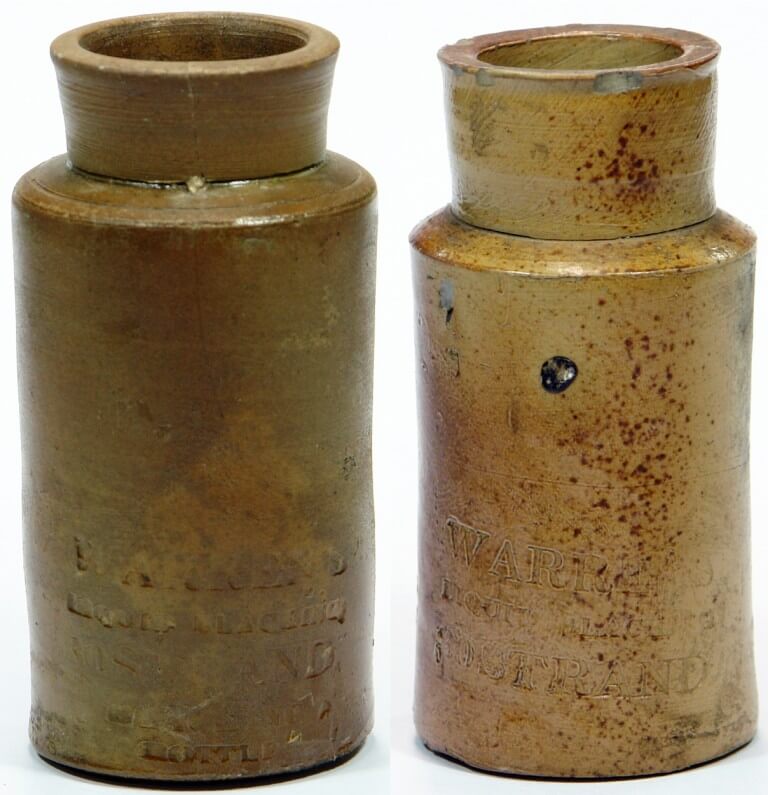c1820s-1830s
Robert Warren was an English blacking manufacturer who became famous for his pioneering methods of advertising and promotion. Perhaps his most famous reported stunt was to have “Buy Warren’s Blacking, 30 Strand, London.” written in huge letters on the side of the Great Pyramid at Ghiza. The letters of indignation and subsequent editorials in newspapers of the day decrying this behaviour served Warren’s purpose perfectly to promote his blacking as far and wide as possible. These same papers mention the demise of the Warren Blacking business as being a result of a lack of paid advertising – quite clearly the opposite of Warren’s original marketing strategy. Warren’s blacking company was operating from at least the very early 1800s until the mid 1850s.
Some later articles suggest that Charles Dickens worked at Warren’s Blacking Factory however on reading Dickens own account he was actually employed at Jonathan Warren’s factory – a rival business. Of course this was later shortened to Warren’s – which by reverse association was assumed by many to be the more famous establishment. Working conditions at both businesses were likely very similar however and so the inspiration for many of Dickens’ works would just as easily have been found in either manufactory. This link was blurred further by the fact Robert Warren was also in the habit of hiring poets to write promotional ditties and advertising copy for him during the same period.

Some interesting snippets relating to Warren’s blacking:
As Mr Warren, the blacking manufacturer, with his family, were spending the evening at the house of a friend in the Westminster-road, one Sunday in December last, information was brought that a fire had broken out at a manufactory in the neighbourhood of Church-street, Lambeth. On hearing this, Mr Warren, who had a Congreve and lucifer-match manufactory at the spot, suddenly started up in great alarm, expressing his suspicion that it was his own premises which were being- destroyed. He immediately rushed out of the house, and hastened to the scene of conflagration, when he found that the premises on fire were those of Messrs Ogleby and Field, of Princes-street. Having ascertained that his own property was safe, Mr Warren proceeded on his road back to his friend’s house, and had proceeded as far as the end of Lambeth-walk, past the palace, where he suddenly fell down dead on the pavement. The body was immediately conveyed to the shop of Mr Corrie, surgeon, near Astley’s Theatre, in the hope that some spark of life might be remaining, but every effort that could be made to restore animation proved utterly unavailing.
South Australian Register Adelaide 18th May 1844
Non-advertising and its consequences – Warren’s celebrated blacking manufactory has now ceased to be. The business has “died” out, simply from a resolution taken by the proprietors, who succeeded the spirited original of the firm, “to discontinue advertising in the newspapers as a useless expense.” The consequence might have been foreseen, The firm of “Warren” has ceased to exist within one generation – English Paper.
Hobart Town Mercury 6th May 1857: Miscellaneous
When the great blacking-maker of London despatched his agent to Egypt to write on the pyramids of Ghiza, in huge letters “Buy Warren’s Blacking, 30 Strand, London” he was not “cheating” travellers upon the Nile. His blacking was really a superior article, and well worth the price charged for it, but he was “humbugging” the public by this queer war of arresting attention. It turned out just as he anticipated, that English travellers in that part of Egypt were indignant at the desecration and they wrote back to the London Times (every Englishman writes or threatens to “write to the Times” if anything goes wrong), denouncing the “Goths” who had thus disfigured these ancient pyramids by writing on them in monstrous letters, “Buy Warren’s Blacking, 30 Strand, London.” The “Times” published these letters, and backed them up by several of those awfully grand and dictatorial editorials peculiar to the great “Thunderer” in which the blacking-maker, “Warren, 30 Strand,” was stigmatised as a man who had no respect for the ancient patriarchs and who would not hesitate to sell his blacking on the sarcophagus of Pharoah, “or any other” mummy, if he could only make money by it. In fact, to cap the climax, Warren was denounced as a “humbug.” The indignant articles were copied into all the provincial journals, and very soon, in this manner, the columns of every newspaper in Great Britain were teeming with this advice “Try Warren’s Blacking, 30 Strand, London.” The curiosity of the public was thus aroused, and they did “try” it, and finding it a superior article, they continued to purchase it and recommend it to their friends, and Warren made a fortune by it. But Warren did not cheat his customers, nor practise “an imposition under false pretences.” he was a charlatan, a humbug, but he was an upright honest man, and no one called him an imposter or cheat.
Hobart Mercury 24th January 1865: Barnum on Humbug
I GIVE now the fragment of the autobiography of Dickens “This speculation was a rivalry of ‘ Warren’s Blacking, 30, Strand,’–at that time very famous. One Jonathan Warren (the famous one was Robert), living at 30, Hungerford-stairs, or market, Strand (for I forget which it was called then), claimed to have been the original inventor or proprietor of the blacking recipe, and to have been deposed and ill-used by his renowned relation. At last he put himself in the way of selling his recipe, and his name, and his 30, Hungerford-stairs, Strand (30, Strand, very large, and the intermediate direction very small), for an annuity ; and he set forth by his agents that a little capital would make a great business of it. The man of some property was found in George Lamert, the cousin and brother-in-law of James. He bought this right and title, and went into the blacking business and the blacking premises–in an evil hour for me, as I often bitterly thought. Its chief manager, James Lamert, the relative who had lived with us in Bayham-street, seeing how I was employed from day to day, and knowing what our domestic circumstances then were, proposed that I should go into the blacking warehouse, to be as useful as I could, at a salary, I think, of six shillings a week. I am not clear whether it was six or seven. I am inclined to believe, from my uncertainty on this head, that it was six at first and seven afterwards. At any rate the offer was accepted very willingly by my father and mother, and on a Monday morning I went down to the blacking warehouse to begin my business life. It is wonderful to me how I could have been so easily cast away at such an age. It is wonderful to me that, even after my descent into the poor little drudge I had been since we came to London, no one had compassion enough on me–a child of singular abilities, quick, eager, delicate, and soon hurt, bodily or mentally–to suggest that something might have been spared, as certainly it might have been, to place me at any common school. Our friends, I take it, were tired out. No one made any sign. My father and mother were quite satisfied. They could hardly have been more so, if I had been twenty years of age, distinguished at a grammar-school, and going to Cambridge. The blacking warehouse was the last house on the left-hand side of the way, at old Hungerford-stairs. It was a crazy, tumble-down old house, abutting of course on the river, and literally overrun with rats. Its wainscotted rooms, and its rotten floors and stair-case, and the old grey rats swarming down in the cellars, and the sound of their squeaking and scuffling coming up the stairs at all times, and the dirt and decay of the place, rise up visibly before me, as if I were there again. The counting house was on the first floor, looking over the coal-barges and the river. There was a recess in it, in which I was to sit and work. My work was to cover the pots of paste-blackings–first with a piece of oil paper, and then with a piece of blue paper ; to tie them round Fix this next with a string ; and then to clip the paper close and neat. all round, until it looked as smart as a pot of ointment from an apothecary’s shop. When a certain number of grosses of pots had attained this pitch of perfection, I was to paste on each a printed label, and then go on again with more pots. Two or three other boys were kept at similar duty down stairs on similar wages. One of them came up, in a ragged apron and paper cap, on the first Monday morning, to show me the trick of using the string and tying the knot. His name was Bob Fagin ; and I took the liberty of using his name, long after- words in “Oliver Twist.”
Brisbane Courier 28th February 1872: DICKENS’ EARLY TRIALS
